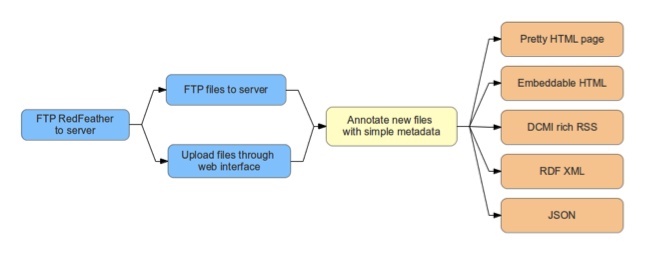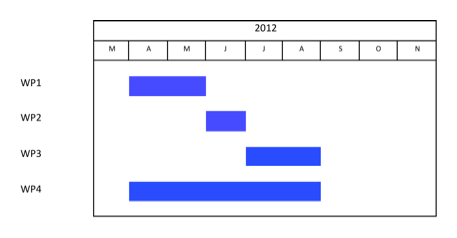RedFeather Project Plan
Project Overview
Currently there are significant barriers to individuals or smaller groups publishing OER materials. They can upload their work to a website, but rich media is effectively dark to search engines without adequate metadata, in addition they may forget important licensing information, and materials published this way are invisible to national indexers like Jorum or Xpert. RedFeather (Resource Exhibition and Discovery) is a proposed lightweight repository server-side script that fosters best practice for OER, it can be dropped into any website with PHP, and which enables appropriate metadata to be assigned to resources, creates views in multiple formats (including HTML with in-browser previews, RSS and JSON), and provides instant tools to submit to Xpert and Jorum, or migrate to full repository platforms via SWORD. RedFeather will require no significant technical expertise and no database, but will provide a simple and effective repository solution for smaller projects, individuals, or those seeking to demonstrate OER in order to justify a more significant investment in an organisational repository. RedFeather will be demonstrated and evaluated in collaboration with the University’s Archeological Computing and Digital Economy Research Groups.
Anticipated Outputs and Outcomes
- As well as making the creation of OER materials more straightforward RedFeather will foster OER best practice and fits into a number of the key areas identified by JISC:
- It’s main impact will be to improve resource description, at present OER creators seeking a simple solution merely add their resources to a website, and for rich media types this effectively makes them part of the dark web. Using RedFeather will encourage minimal but significant metadata – such as titles, keywords and licensing information – that will make resources more visible to search engines. In addition the multiple views that will be offered by RedFeather (such as RSS, RDF, and JSON) will make resources far more visible to crawlers and other automated systems.
- In addition RedFeather will be specifically designed to promote and enable aggregation and discovery, by using SWORD to link with key OER indexers such as Xpert and Jorum. RedFeather will provide a lightweight gateway through which users can experiment with OER, and yet still participate with national efforts.
- Finally RedFeather will provide out-of-the-box tools to support social recommendation, encouraging users to use social tools such as Facebook, Twitter or Disqus to highlight and share resources. In addition we plan to develop a recommendation plugin based on the Xpert index, which will instantly link RedFeather resources with similar content from the broader OER context.
We anticipate that the Impact of the RedFeather project will be:
- Access to the benefits of OER sharing are widened to users with small, simple cases without the need for an institutional repository
- Previously hidden resources will become available through access to simple OER good practice, increasing the breadth and number of OER resources.
Overall Approach
The intention is that a base install of RedFeather will be a single .php file which can be dropped into almost any web space to provide quick and straight forward access to digital resources.

Have a look at our blog post: who is RedFeather for? which describes the stakeholders in Redfeather and scenarios of use.
Redfeather features will be extended in collaboration with our co-designers to include tools/plugins for social media, recommenders, WordPress
RedFeather interoperability/standards
To ensure productive use of RedFeather we will adopt these standards:
OER Licensing: information based on appropriate Creative Commons licenses
Export standards: RSS, RDF, JSON
Metadata: Dublin Core
RedFeather Deliverables
- RedFeather Core Plugin Framework
- RedFeather HTML View Plugin
- RedFeather RSS Export Plugin
- RedFeather RDF Export Plugin
- RedFeather JSON Export Plugin
- Social and Recommendation Plugins
The software will be made available through the project website (for at least three years )as an Open Source download and licensed for use under Creative Commons GNU general Public License (software).
Project Resources
RedFeather will take an iterative development approach and work closely with stakeholders in both the ACRG and DE USRG. In larger projects we have undertaken the full participatory design process, and we will borrow the more agile elements for RedFeather, for example including stakeholders in project planning, and adopting an agile approach with user meetings acting as a place where stakeholders can participate in the design process. User’s qualitative comments and personal usage stories will also be a core part of the evaluation of the tool, which will be included in the final project report. This user engagement will enable us to tailor the software according to real requirements and needs, and will ultimately result in not only the software becoming available, but also new OER sites that can contribute to the national OER picture, and act as exemplars of what can be achieved with RedFeather
The RedFeather Project team is:
| Dave Millard | Principal Investigator | dem@ecs.soton.ac.uk |
| Yvonne Howard | Project Manager | ymh@ecs.soton.ac.uk |
| Matt Taylor | Developer | mrt@ecs.soton.ac.uk |
Risk Analysis
| Risk Description | Probability P 1(Low) – 5 (High) | Severity S 1(Low) – 5 (High) | Risk Score (PxS) | Detail of action to be taken
(mitigation / reduction / transfer / acceptance) |
| Delay in employing staff | 1 | 5 | 5 | Given the small timescale a prompt start is critical, however a developer is already in place and there is a very low likelihood of any delays. |
| Technical delays | 2 | 3 | 6 | There is a danger that any tool development will take longer than anticipated, or may fail to fulfil requirements. We consider this to be a low risk because of the skill sets present in the development team, however in the event of any delays it will be possible to reduce the scale of the social plugins planned for WP3 in order to ensure successful delivery of the core RedFeather platform. |
Work packages
As a five-month project RedFeather will follow a simple organisation of three work packages (WP1-3) focused on achieving six explicit deliverables (D1-6), and one workpackage focused on dissemination which continue throughout the project. The work package structure is shown below:
WP1: Development
The first work package will set up our co-design team of developers and members of our stakeholder group. The work package will build the RedFeather core, which allows a user to provide metadata for files and creates HTML pages for each file. All components will be plugins so this core will take the form of a simple plugin framework, and a HTML plugin. This will provide the technology framework for RedFeather. The RedFeather core will be available as an on line perpetual beta for testing/ feedback with our co-design team.
Deliverable 1: RedFeather Core Plugin Framework (M2)
Deliverable 2: RedFeather HTML View Plugin (M2)
WP2: Export Plugins
Once the framework is complete, we will work with our co-design team to create plugins to support our use cases, including export plugins for outputting metadata as RSS, RDF, and JSON. Existing metadata schemes/ontologies (such as Dublin Core) will be used wherever possible. The plugins will be available through the perpetual beta deployment set up in WP1
Deliverable 3: RedFeather RSS Export Plugin (M3)
Deliverable 4: RedFeather RDF Export Plugin (M3)
Deliverable 5: RedFeather JSON Export Plugin (M3)
WP3: Deployment and Social Plugins
Finally RedFeather will be evaluated with our early adopters in the ACRG and DE USRG, and final plugins will be developed for social recommendation (e.g. sharing on Facebook/Twitter, commentary and recommendation via Xpert).
Deliverable 6: Social and Recommendation Plugins (M5)
WP4: Communication and Dissemination
Throughout the project will disseminate RedFeather developments and project progress through the project blog. As well as generating interest with our early adopters, we plan to launch Redfeather to the wider OER and repository community at Repofringe 2011. We hope to be able to take RedFeather to OR11 next year.

Leave a Reply